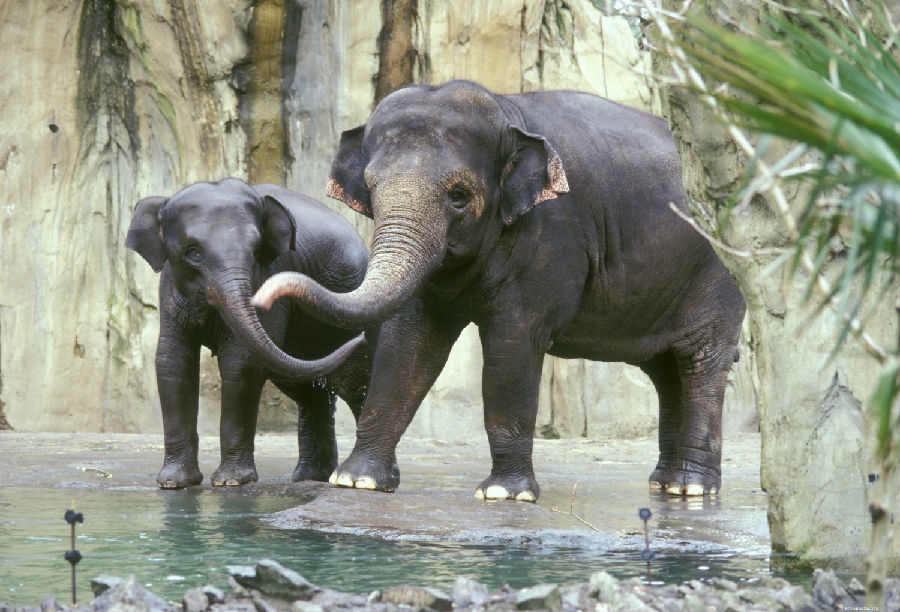(单词翻译:单击)
听力文本
WILLIAM BRANGHAM: There's a new crisis unfolding in the nation of Myanmar. It's the poaching of Asian elephants. As NewsHour producer Nsikan Akpan reports, this fragile species, which is distinct from their more numerous African cousins, is facing a growing threat.
NSIKAN AKPAN: The poaching of African elephants, where they are murdered for their ivory tusks, is well-documented. But halfway around world in Myanmar, their cousins, Asian elephants, are 10 times more endangered and facing a new serious threat. Poachers are taking the elephants' skin and turning it into ruby red jewelry.
PETER LEIMGRUBER, Director, Smithsonian Conservation Biology Institute: Yes, it actually was a huge shock. So we were following these elephants with our collars, and we started noticing that they disappear. If the collar stopped working, then they disappeared.
NSIKAN AKPAN: Peter Leimgruber is head of conservation ecology at the Smithsonian Conservation Biology Institute at the National Zoo in D.C. His team stumbled upon this poaching crisis during a routine tracking study with GPS collars that started in late 2014.

PETER LEIMGRUBER: We had 19 collared. And five of them we knew were poached. We found them poached. And then there were two that disappeared. And the way their movement changed right before they disappeared indicated that they were probably poached too.
NSIKAN AKPAN: This led the researchers and Myanmar officials to collect reports of poaching from local villagers.
PETER LEIMGRUBER: So, in the end, we found about 45 elephants killed in a very small area, area the size of a county.
NSIKAN AKPAN: This poaching was surprising because, unlike their African cousins on the open savanna, Asian elephants prefer the seclusion of the jungle, making them hard to hunt. John McEvoy was one of the researchers in the field.
JOHN MCEVOY, Smithsonian Conservation Biology Institute: Even our trackers have to spend hours and hours in the bush fighting through vines and other vegetation to even be able to see the elephants, so we can put the collars on them.
NSIKAN AKPAN: Prior to 2014, Asian elephant poaching had been relatively uncommon, because only males have ivory tusks, and, even then, it's a small percentage.
PETER LEIMGRUBER: But now that the females and calves are being affected, this will be a very significant impact on the population. It will actually, it's the surest way to drive the species into extinction.
NSIKAN AKPAN: A separate survey by the Myanmar government reported 25 poached elephants in 2016. Combined with the Smithsonian tally, that's 70 poached elephants over the last three years, double what the country witnessed from 2010 to 2014. Due to habitat loss, roughly 2,000 wild elephants remain in Myanmar. So, at its current rate, skin poaching could wipe out this population in just over 50 years.
BELINDA STEWART-COX, Executive Director, Elephant Family: And a lot of the buyers likes buy the original skin, which is sold by weight, because then they can see the original product and know that it's real.
NSIKAN AKPAN: Belinda Stewart-Cox is the executive director of Elephant Family, a British conservation group that specializes in protecting Asian elephants. Since late 2014, Elephant Family has been investigating this skin poaching and the black market trade surrounding it. Under international law, countries are allowed to import elephant skin from four African nations. But trading of Asian elephant in any form is prohibited, except in rare cases. To thwart potential sales of these new products in the U.S., Japan or other popular destinations for elephant parts, the Smithsonian, U.S., Fish and Wildlife and groups working in Myanmar are making public service announcements.
PETER LEIMGRUBER: Most people that purchase these products have no idea what they're doing. So, we need to go to the places where the markets are and educate consumers about how damaging the impact is of what they're doing.
NSIKAN AKPAN: If this killing spreads, it could threaten the 50,000 Asian elephants left in the wild. Leimgruber said the key is reducing market demand for these products, before these animals are all gone. For the PBS NewsHour, I'm Nsikan Akpan, reporting from Washington, D.C.
重点解析
1.distinct from 不同于
Engineering and technology are disciplines distinct from one another and from science
工程学和工艺学互不相同,也有别于自然学科。
2.specialize in 专门
There are restaurants, both humble and expensive, that specialize in them
专门做这些菜的餐馆既有毫不起眼的也有价格昂贵的。
3.wipe out 消灭
The spill could wipe out the Gulf's turtle population
这次原油泄漏可能会使波斯湾的海龟灭绝。
4.combined with 联合
If improved education is combined with other factors dramatic results can be achieved
如果把改良的教育体系和其他的因素结合起来,会取得非常惊人的效果。
5.due to 由于
Unfortunately, due to unforeseen circumstances, this year's show has been cancelled
遗憾的是,由于一些意外情况,今年的演出被取消了。
参考译文
威廉·布朗汉姆:在缅甸这个国家,新的危机正在展露。这就是对亚洲象的偷猎。正如《新闻时报》制片人尼坎·阿克潘所报道,这个脆弱的物种,与其更广大的非洲兄弟姐妹不同,正面临着越来越大的威胁。
尼坎·阿克潘:偷猎非洲象,因为要杀之取牙,证据充分。但是在缅甸,他们濒临灭绝的堂兄亚洲象面临着新的严重威胁,危险程度高出世界其他地方十倍。偷猎者正将大象的皮肤制成红宝石首饰。
彼得·雷姆鲁伯,史密森尼保护生物学会会长:是的,它实际上是一个巨大的冲击。所以我们用项圈跟踪这些大象,我们开始注意到它们消失了。如果项圈停止工作,那么它们就消失了。
尼坎·阿克潘:彼得·雷姆鲁伯是位于华盛顿特区国家动物园,史密森尼保护生物学会的保护生态学负责人。他的团队在2014年底一次用GPS项圈进行常规跟踪研究时,偶然发现了这场偷猎危机。
彼得·雷姆鲁伯:我们布设有19个项圈。我们知道,其中有五只都被偷猎走了。我们发现他们被偷猎走了。然后有两只消失了。他们失踪之前的运动方式表明他们也可能遭到了偷猎。
尼坎·阿克潘:这让研究人员和缅甸官员不得不向当地村民搜集关于偷猎的信息。
彼得·雷姆鲁伯:最后,我们发现,偷猎者在一个非常小的区域内杀死了大约45只大象,面积与一个县相当。
尼坎·阿克潘:这次偷猎令人震惊,因为与那些它们在开放大草原上的非洲兄弟姐妹不同,亚洲象更喜欢丛林隐居生活,因此捕猎它们相当困难。约翰·麦克沃伊是该领域的研究人员之一。
约翰·麦克沃伊,史密森尼保护生物学会:即使是我们的追踪者也必须花费数小时,在丛林中与葡萄藤和其他植物摸爬滚打一番,才能见到大象,把项圈安置在它们身上。
尼坎·阿克潘:2014年之前,亚洲象的偷猎相对不那么常见,因为只有雄性才有象牙,即便如此,它只占一小部分。
彼得·雷姆鲁伯:但现在雌性和幼崽也在遭受影响,这将对它们的种群产生至关重要的影响。这实际上,这是将物种推向灭绝的最可靠方法。
尼坎·阿克潘:缅甸政府另外一项调查显示,2016年有25只大象遭到偷猎。结合史密森尼学会的统计数据,过去三年中,有70只大象遭到偷猎,是该国2010年至2014年偷猎事件发生的两倍。由于栖息地丧失,缅甸的野生大象大约仅剩2,000只。因此,按照目前的速度,象皮偷猎可能在短短50多年内将这一种群消灭。
贝琳达·斯图尔特-考克斯,执行董事,大象之家:许多买家喜欢购买原皮,就是按重量出售,因为他们可以看到原始产品,并知道它是真货。
尼坎·阿克潘: 贝琳达·斯图尔特-考克斯是大象之家的执行主任,该组织是一个专门保护亚洲象的英国组织。自2014年底以来,大象之家一直在调查这次象皮偷猎及其周围的黑市交易。根据国际法,各国可以从四个非洲国家进口象皮。但亚洲象任何形式的交易均是被禁止的,除非罕见情况。为了阻止这些新产品在美国,日本或其他受欢迎的大象各部在目的地潜在销售,美国史密森尼保护生物学会,鱼类和野生动物保护组织以及在缅甸工作的团体正发出公共服务公告。
彼得·雷姆鲁伯:大多数购买这些产品的人都并不知道他们在做什么。所以,我们需要去有市场的地方,去教育消费者,告诉他们,他们正在做的事情会造成怎样的伤害。
尼坎·阿克潘:如果这种杀戮蔓延,它可能会威胁到50,000只野生亚洲象。雷姆鲁伯说,关键是要在这些动物全部消失之前,减少这些产品的市场需求。PBS《新闻时报》,我是尼坎·阿克潘,华盛顿特区报道。
译文为可可英语翻译,未经授权请勿转载!


